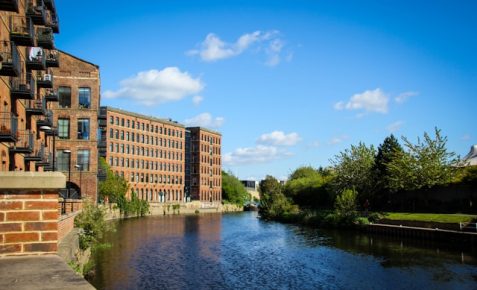When do you apply for student accommodation?
 With new friends to party the night away with, uni life is going to be a lot of fun. Bear in mind, though, that when you put your key in the lock in the early hours, you’ll want home to be, well, homely. So it’s important to make the right decisions about where you’re going to live while you’re studying.
With new friends to party the night away with, uni life is going to be a lot of fun. Bear in mind, though, that when you put your key in the lock in the early hours, you’ll want home to be, well, homely. So it’s important to make the right decisions about where you’re going to live while you’re studying.
Having accommodation that suits you will help ensure you’re happy at university, so it’s worth doing a bit of research and giving it some thought. If you want to be in halls of residence, deadlines and requirements differ across course providers so you’ll need to check carefully with your chosen uni and make sure you apply in time.
Student accommodation options
There are different types of student accommodation available and each has pros and cons that you need to weigh up. Do you want to be on campus or in the city centre? Do you want to be in catered or self-catered accommodation? Remember that shared spaces such as kitchens are a great place to spark friendships at the start of term without things being…err, um…awkward. And kitchens are also where most of the parties happen!
Another important factor is your budget. Bear in mind that the maximum non-means-tested maintenance loan from Student Finance England may not cover your rent (let alone your other living costs), so you may need another source of income such as part-time work, contributions from your parents or savings. Another thing to think about is whether you’ll want to be in your accommodation in the holidays, as tenancy contracts vary in length between term-time only to a full year. The accommodation options are:
- Halls of residence
- Private halls of residence
- Shared house or flat
- Living at home
Halls of residence
Often the choice of first-year undergraduates, halls of residence are owned and operated by the university. As they are normally located on campus, they are very convenient and consequently extremely popular. Most unis will reserve accommodation in their halls for freshers and some will even guarantee you a room as a first-year student, provided you apply in time. According to the Which? University Student Survey 2019, 40% of the 3874 students surveyed were living in university halls of residence.
Private halls of residence
These are similar to university halls of residence but are owned by private companies, although some work in partnership with universities. As such, they won’t be on campus but may instead be in the town or city centre, close to shops and nightlife. Generally they are purpose-built, so have great facilities and most bills are included in the rent, so it’s clear where you stand financially.
…many of which have signed up to the ANUK/Unipol National Codes, a set of student housing standards that offer reassurance that the accommodation is safe and well managed
The Which? survey found that 7% of students take this option. In private halls, you’ll be living with other students but they may attend a different educational institution, bringing a diversity that many people find attractive. Some are operated by national or regional chains, many of which have signed up to the ANUK/Unipol National Codes, a set of student housing standards that offer reassurance that the accommodation is safe and well managed.
Shared house or flat
Most uni cities have a large stock of privately rented housing to choose from. The Which? survey showed that 23% of students live in privately rented accommodation, while a further 5% live near their uni in a house/flat they own or their family owns.
Living at home
Although for most students the experience of uni would not be complete without living away from home, some young people do choose to live at home while studying. In fact, the Which? accommodation survey found that a surprising 24% of university students live at home or with family while studying. While for some this is a personal choice, many are forced to live at home in order to meet a tight budget. It’s a particularly popular option for students who can commute into London due to the prohibitive cost of accommodation in the capital.
When to apply for student accommodation
This depends on the type of accommodation you’ve selected. For university halls of residence, you’ll find that the deadlines and requirements vary by course provider, so you’ll need to check the website of your chosen uni. Most application windows for accommodation open some time between November and May and the deadline for applications will usually be in July (but the date may be earlier for postgraduate students). Typically, the application process is closed around A Level results day and then reopens again afterwards.
If you have special requirements – such as a disability or medical condition – you should state this in your application, as your needs should then be prioritised.
While some unis allow you to apply for accommodation even if you’ve put them as your insurance option, most will only let you apply if they’re your firm choice. Some universities allocate their rooms on a first-come, first-served basis but many do not. Instead, they will treat all applications that are made in time equally and try to meet the preferences of individual students as best they can. If you have special requirements – such as a disability or medical condition – you should state this in your application, as your needs should then be prioritised.
…Existing students and new students with unconditional offers can normally arrange their accommodation straight away
For private halls of residence, it’s wise to begin your search early in the year in which your studies will begin to ensure availability of high-quality accommodation at the best price. Existing students and new students with unconditional offers can normally arrange their accommodation straight away. Otherwise, you’ll need to wait until you get your exam results and you know for sure which uni you’re going to.
How to apply for student accommodation
The exact process of applying for student accommodation will vary from university to university, so you need to check the website of your course provider carefully. If the uni also works in partnership with a private halls provider, it may manage the process for allocating these rooms as well as their own. You’ll need to register and apply online through the uni’s accommodation portal using either your UCAS number or a student ID that you’ll get from the university. Remember not to use your school e-mail address, as this may not be available to you after you’ve left! Each uni will have its own protocols and deadlines but, as a guide, here’s how the process typically looks:
- You accept your academic offer
- You decide on your preferred accommodation (usually several choices, ranked in order)
- You submit your application, stating any special requirements
- The university allocates you a room and sends you an accommodation offer
- You read the T&Cs, accept the offer and thereby create a legally binding contract
Even if your accommodation isn’t allocated on a first-come, first-served basis, it pays to start your research as early as possible to give yourself the most options and ensure you’re ready to make decisions quickly if required. Check out the accommodation in person, if you can. If that’s not possible, take a virtual tour, look at photos/videos and read any reviews you can find online. Think about what type of location you’d be most comfortable in, what you can afford, which facilities you feel you must have and those that you’d be prepared to compromise on. Discuss it with family and friends, or with current students in one of the many live chat rooms available.
…it pays to start your research as early as possible to give yourself the most options and ensure you’re ready to make decisions quickly if required.
Remember that whatever type of accommodation you choose, you will most likely have to pay a deposit. This is usually refunded at the end of the contract, minus the cost of any damage or outstanding rent. For most types of student accommodation, you will also need to provide details of a guarantor (someone who will be responsible for paying your rent if you are unable to), which may be a parent or guardian. There may be differences between your student loan payment dates and your rent payment dates that might cause you cash flow issues; discuss this with your guarantor and ask if they’d be prepared to help you with a temporary loan in this scenario.
Finally, don’t worry if you hear that friends going to the same uni get allocated a room before you hear about yours – with thousands of applications to process, it takes universities several weeks to send out their accommodation offers.
Source: Which? University Student Survey 2019


